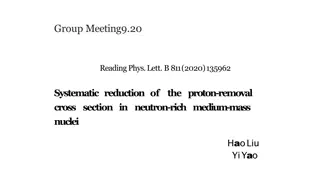General Knowledge of Single Virechana Dravya
Trivrutta, also known as Operculina turpenthum, belongs to the Convolvulaceae family. It has properties like Rasa: Kashaya, Guna: Laghu, Ruksha, Tikshna, Virya: Ushna, Vipaka: Katu, and is beneficial for balancing Pitta and Kapha doshas. The root of Trivrutta contains an active principle called turpenthin, which is responsible for its purgative effects. Collection and preservation of Trivrutta involve specific guidelines like collecting during Shukla Paksha, fasting, wearing white garments, and drying the bark for preservation.
Uploaded on Feb 28, 2025 | 0 Views
Download Presentation

Please find below an Image/Link to download the presentation.
The content on the website is provided AS IS for your information and personal use only. It may not be sold, licensed, or shared on other websites without obtaining consent from the author. Download presentation by click this link. If you encounter any issues during the download, it is possible that the publisher has removed the file from their server.
E N D
Presentation Transcript
GENERAL KNOWLEDGE OF SINGLE VIRECHANA DRAVYA
1) Trivrutta Latin name operculina turpenthum Family Convolvulaceae Synonyms
Guna Karma Rasa kashaya Madhura Guna Laghu Ruksha Tikshna Veerya Ushna Vipaka Katu Doshaghnata Pitta kaphhara Chem . Composition Root contains an active principle glycoside resin named as turpenthin responsible for purgation
Collection and preservation The road should be collected from the herbs grown in good soil and place Should be collected in Shukla paksha Person going to collect should be fasting and wear white garment The route that has peenited Deep which is smooth and has not spread sideways should be gathered It should be split and peeth inside should be removed and the bark should be dried and preserved
Katuki Botanical name-Picrorhiza kurroa Family-Scrophulariaceae Synonyms- Katvi , katuka, Tiktaa , krishnabheda , katambhara, Ashoka, Matsyasakala, Chakrangi shakuladani Matsyapitta Kandruha katurohini.
Guna Karma Rasa Tikta Guna Ruksha Laghu Vipaka Katu Veerya Sheeta Doshaghnata Kapha pittahara Chem composition Root contains Cathartic acid which is responsible for purgation
Haritaki Latin name Terminalia chebula Haritaki , Abhaya, Pathya, Kayastha, Putana, Amruta, Haimvati, vayastha, Chetaki, Shreyasi, Shiva, Vayastha, Vijaya, Jeevanti, Rohini.
Guna karma Rasa Pancha rasa, kashaya Pradhan Guna Laghu Ruksha Veerya Ushna Vipaka Madhura Doshaghnata Vatakaphahara Chem composition Myrobalan contains Tannic acid, Gallic acid and Resin.
Aragwadha Botanical name cassia fistula Family leguminosae Synonym Aragwadha, Rajvruksha, Shampaka , Chaturanguala, Pragraha , Krutmala Karnika, Avghataka.
Guna Karma Rasa Madhura guna Guru Mridu Snigdha Veerya Sheeta Vipaka Madhura Doshaghnata Vata kaphahara Chem composition Aqueous extract of fruits pulp has significant purgative action due to the presence of Anthraquinone rhein
Collection and preservation Fruits should be collected in fruiting season. Fruits which are heavy and reach in pulse should be collected and preserved in sand After 7 days fruits should be derived in sunlight and pulp should be taken out and preserved
Eranda Botanical name recinus communis familyEuphorbiaceae Synonyms Eranda , Aamnda, Chitra, Gandharvahasta, Panchangula , Vardhmana, Dheergadanda , Vyadambaka
Guna karma Rasa Madhura Katu Anurasa Kashaya Guna Tikshna Virya Ushna Vipaka Madhura Karma dipana stroto vishodhan Doshaghnata vata kaphhara
Jayapala Botanical name croton tinglium Family Euphorbiaceae Synonym Danti bija , Tintidiphala Guna karma Rasa katu Guna Guru Snigdha Tikshna Veerya ushna Vipaka Katu
Karma Kapha vata Hara Deepana Jalodarahara Doshaghnata kapha vatahara Chem composition-seeds containing Tiglic acid , crotonic or quartendic acid and proton oil Crotonic acid is the active principle of Croton oil

 undefined
undefined


























